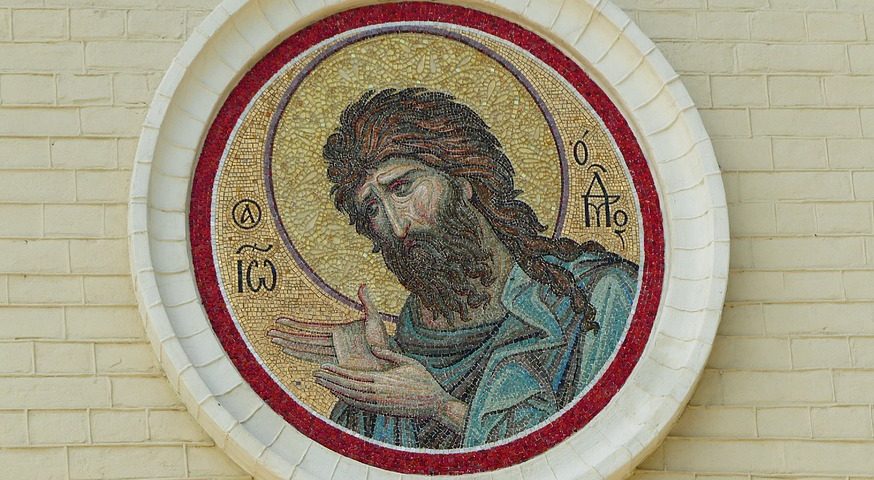In Advent the Church speaks to us quite clearly, actually.
I speak mystically of the Church, not institutionally or bureaucratically; the Church in that form is often far from clear. I’m talking about the Church that speaks through worship and the word of God, liturgy and Scripture, the Church you can only hear in a place like this. The devil I’m sure knows this, which is why I think this season gets so busy and noisy and anxious. Because the devil doesn’t want you to hear.
“In the fifteenth year of the reign of Tiberius Caesar, when Pontius Pilate was governor of Judea…the word of God came to John…in the desert.” That’s what we heard last Sunday. He came to prepare “the way of the Lord.” To those who came to hear him, John the Baptist called them a “brood of vipers.” He asked them, who warned them to “flee from the coming wrath.”[1] He convicted them and invited them in same breath. Vipers though they were, they were there. There is hope then even for vipers if they can stand the truth, if they can weather the offense. What if I called some of you vipers, would you stay? Perhaps, but only if you really believed.
And so, at the news of the advent of the Messiah, news that he’s coming, those who weren’t too insulted, who didn’t leave: they asked a quite natural question. “What then should we do?”[2] Interestingly, it’s the exact same question the people asked Peter after he preached his first sermon at Pentecost.[3] This, in Luke’s mind at least, is an essential question, fundamental to faith. “What then should we do?”
Now, let’s admit, this question by itself is a moral achievement. Many people never even make this far, never mature enough in the faith even to ask it. “What then should we do?” It’s a moral achievement, this question, to realize that Christ’s advent changes things, that the Gospel demands some sort of response, some sort of action. As I said, many people haven’t made it even this far—I’m talking about Christians, Catholics here. Many have never really asked themselves this question, a question Luke says is essential. “What shall we do?” If the Gospel doesn’t provoke this question, if it doesn’t cause you to ask just this question—“What shall we do?”—maybe you’ve never actually heard the Gospel preached (which is often a sad reality) or maybe your soul is in jeopardy. Either way, be very careful.
But what does John the Baptist say? Peter’s answer to this question in Acts of the Apostles was religious and sacramental. “Repent and be baptized,” he said.[4] John’s answer is ethical. If you have two cloaks and the other person doesn’t have one: share. Tax collectors: stop cheating people. Soldiers: stop extorting.[5] Frighteningly, John the Baptist’s answer is quite unreligious. He talks about the ethics of everyday life, the ethics of the workplace. He goes where most preachers won’t go today—to your office. How are you as an employer? Are you just? How are you as an employee? Are you ethical? Have you ever said you were just doing your job? Have you ever asked about the morality of your work, your profits?
We preachers don’t talk like that today, mostly because we’ve lost the trust and support of the poor, and so now we’re afraid. We fear you and your money, which makes sense given the number of times people have told us that they’re taking their money for things we’ve said. Every time I make a decision or say something someone doesn’t like, there’s often someone (or two) ready to tell me their taking their money elsewhere. There’s a reason we don’t have the preachers we used to have, and it’s not just because we preachers have become poor speakers. Would that we could see more preachers like Father Barry, that mythical beautiful priest in On the Waterfont. Standing in the hull of a great cargo ship, preaching to longshoremen and gangsters, mired in corruption, he dared to say, “Boys this is my church! And if you don’t think Christ is down here on the waterfront you’ve got another guess coming!”[6] Would that we had more preachers like that to talk like that. The Church would be different then. But, of course, what sort of people would we need to become to have and to hear such preachers again?
That’s the challenge. Christ is coming. If you’re moral enough to ask the question—“What shall we do?”—the next question put right back to you is real and brutal and hard, a question that can smack you right in the face. And that is, will you welcome the Gospel into every part of your life? Will you let the Gospel into your office? Will you let the Gospel stand between you and the stranger, the beggar, that irritating person? Will you let the Gospel go with you online? “What shall we do?” Can I ask this question? Can you ask this question?
I hope so. Otherwise, this joy the Church says can be yours will seem a million miles away. And not because it’s far away from you, but because you are far away from it. “What shall we do?” they asked. What will you do? It’s the question this mystical Church asks each of us today—just like we were there, listening to that prophet and that preacher, that John the Baptist, who was preparing the way for us too. Amen.
[1] Luke 3:1-7
[2] Luke 3:10
[3] Acts 2:37
[4] Acts 2:38
[5] Luke 3:11-14
[6] Budd Schulberg, On the Waterfront, Elia Kazan, dir. (1954)
© 2021 Rev. Joshua J. Whitfield










